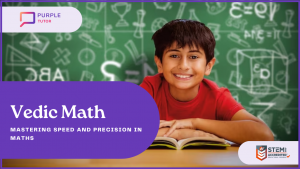
In the realm of mathematics education, Vedic Math shines as a beacon of holistic learning, offering a unique approach to mastering mathematics. Tailored to students aged 6-18, this ancient system of mathematical principles enriches mathematical skills while nurturing mental agility. In this comprehensive guide, we will delve into the world of Vedic Math, exploring its power, and how it makes mathematics easy. Whether you are a parent seeking to enhance your child’s mathematical prowess or a young student eager to explore the realm of numbers, Vedic Math offers a unique approach to mastering mathematics and improving mental math skills.
Understanding Vedic Mathematics
Vedic Mathematics, in contrast to conventional approaches, simplifies mathematics in a way that feels like unlocking secret codes. Derived from ancient Indian texts, these techniques make learning math accessible and enjoyable, turning complex calculations into a breeze.
Let’s delve into the concept of Vedic Mathematics with an example to illustrate how it simplifies mathematical calculations using special techniques.
Example: Multiplying Numbers Ending in 5
In conventional mathematics, multiplying numbers ending in 5 can be a bit cumbersome, especially when dealing with larger numbers. Let’s say you want to multiply 35 by 45.
- Conventional Approach:
- Multiply the non-5 part of the numbers: 3 * 4 = 12.
- To find the last two digits, you multiply 5 * 5 = 25.
- Finally, combine the results from steps 1 and 2: 1225.
Now, let’s see how Vedic Mathematics simplifies this process using a technique called “Nikhilam Navatashcaramam Dashatah.”
- Vedic Mathematics Approach for Multiplying 35 by 45:
- First, subtract 5 from each of the numbers: 35 – 5 = 30 and 45 – 5 = 40.
- Multiply the results: 30 * 40 = 1200.
- To find the last two digits, multiply the last digits of the original numbers (5 and 5) and append 25 to the result: 5 * 5 = 25.
- Combine the results from steps 2 and 3: 1,200 + 25 = 1,225.
This is just one example of how Vedic Mathematics simplifies complex calculations, making math more approachable for students and enthusiasts alike.
The Benefits of Vedic Math Courses
- Efficiency Beyond Measure
One of the primary advantages of Vedic Math is its unparalleled efficiency. It simplifies mathematical concepts, making them more intuitive and enjoyable for young learners, and fosters a deeper understanding of math by revealing the underlying patterns and relationships. Students can perform calculations mentally and rapidly, a valuable skill that aids not only in academics but also in real-life scenarios. From multiplication to division, Vedic Math unveils shortcuts that empower students to excel.
Let’s illustrate the unparalleled efficiency of Vedic Math with an example involving the multiplication of a two-digit number by 11
To Multiply 12 by 11 using Vedic Math, follow these simple steps:
- Write down the first digit of the original number, which is 1.
- To find the middle digit, add the two digits of the original number (1 + 2 = 3) and write it in the middle.
- Write down the last digit of the original number, which is 2.
So, when you multiply 12 by 11 using Vedic Math, you get the result directly: 132. Try out this method to multiply any two-digit number by 11!
Example: Algebra, often seen as challenging, becomes approachable through Vedic Math’s techniques like “Ekadhikena Purvena” (One More than the Previous). For instance, to find the square of 9, you add 1 to 9 and then multiply the result (10) by the original number (9), giving you 90, which represents 9 squares.
2. Faster Calculations
Vedic Math courses make students excel in calculation speed. Students can calculate sums, products, and divisions rapidly, a valuable skill for exams, competitions and everyday life.
Example: Long division, often viewed as tedious, becomes swift and efficient using Vedic Math’s “Nikhilam Navatashcaramam Dashatah” technique. For instance, when dividing 789 by 9, this technique simplifies the process by considering only the remainders.
Drawbacks of Vedic Math courses
Vedic Math courses are known for their focus on mental math techniques and shortcuts, which can be incredibly helpful for performing calculations quickly and efficiently. However, these courses may not provide complete coverage of the entire math curriculum for several reasons:
1. Limited Mathematical Foundation:
Vedic mathematics is primarily a collection of mental math techniques and shortcuts. Relying solely on Vedic Math Courses can leave students with gaps in their understanding of fundamental mathematical concepts. They may struggle when confronted with math problems that require a deeper understanding or a more formal approach. Some of the examples in which Vedic Math courses leave students in a fix are mentioned below:
Expanding of numbers
Suppose a student has exclusively learned Vedic mathematics and hasn’t been exposed to traditional mathematics. Let’s examine how this limitation becomes evident when confronted with a basic algebraic problem of expanding numbers in squares:
Solution by Vedic math Techniques
Expanding numbers in squares (23)2 =
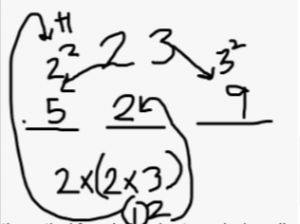
Traditional approach of solving Squares :
(23)2 = (20+3)2
= (20)2 + 2 x (20×3) + (3)2
= 400 + 120 + 9 = 529
Here applying the shortcut for finding square root was easy but the student will not be able to get an idea of Algebra logic which is behind the same, thus leaving basics of Algebra behind will be a problem.
2. Lack of Understanding of Variables:
Vedic math courses primarily focus on arithmetic and mental math techniques, often involving whole numbers. The concept of variables (represented here by ‘x’) and algebraic equations may not have been adequately covered. As a result, the student may not understand the significance of ‘x’ in this equation.
3. Lack of complete Curriculum coverage
Vedic Math courses are known for their focus on mental math techniques and shortcuts, which can be incredibly helpful for performing calculations quickly and efficiently. However, these courses may not provide complete coverage of the entire math curriculum for several reasons:
- Narrow Focus: Vedic Math primarily emphasizes mental calculation techniques, such as multiplication, division, addition, and subtraction shortcuts. While these skills are valuable, they represent only a subset of the broader math curriculum.
- Lack of Depth: Vedic Math may not cover certain topics in-depth. For example, advanced topics like calculus, linear algebra, and complex numbers are typically not addressed in Vedic Math courses.
- Limited Application: Vedic Math courses do not address the full range of mathematical applications and problem-solving techniques needed in modern mathematics and related fields.
- Standardized Testing: Many standardized tests and exams (such as SAT, ACT, GRE, and academic curriculum standards) require a broader understanding of mathematics than what Vedic Math courses typically offers. Students preparing for these exams may need to supplement their Vedic Math knowledge with additional math education.
- Lack of Conceptual Foundations: Vedic Math courses teach techniques that are often presented as shortcuts and practical methods but may not delve into the theoretical foundations of mathematical concepts, which are important for a deeper understanding of mathematics.
- Limited Problem Types: Vedic Math focuses on specific types of problems and may not address the wide variety of mathematical challenges encountered in real-world applications and academic coursework.
Why Choose PurpleTutor Math Live Courses
- Expert Instructors: PurpleTutor offers a team of experienced instructors who specialize in building conceptual clarity along with teaching Vedic Math techniques.
- Comprehensive Curriculum: PurpleTutor’s Math Live Courses provide a structured curriculum that covers a wide range of Vedic Math techniques along with building a solid conceptual base. Students can progress at their own pace, ensuring a thorough understanding.
- Interactive Learning: PurpleTutor’s online platform fosters interactive learning experiences. Students can ask questions, participate in discussions, and collaborate with peers, making learning Conceptual and Vedic Math an engaging journey.
- Individualized Attention: With smaller class sizes, PurpleTutor ensures that each student receives the attention they need. Instructors can address individual challenges and provide tailored guidance.
- Convenience: PurpleTutor Math Live Courses are accessible from the comfort of your home. This convenience eliminates the need for commuting and allows students to schedule classes around their routines.
- Proven Results: PurpleTutor Math Live Courses have a track record of success. Many students have excelled in mathematics and developed a strong foundation in Conceptual Vedic Math techniques through these courses.
Summary
In summary, PurpleTutor Math Live Courses provide a holistic learning experience in Vedic Math, combining expert instruction, interactive learning, convenience, and a supportive community. Choosing PurpleTutor can significantly enhance a student’s journey into the world of Mathematics.
To unlock the full potential of Vedic Math, consider enrolling your child in PurpleTutor Math Live Classes, where learning becomes an exciting adventure, and math becomes a superpower. Start your math journey with a Comprehensive Conceptual and Vedic Math courses for beginners today!
Frequently Asked Questions (FAQs):
- Is there a free math demo class at PurpleTutor?
- Yes, PurpleTutor offers a complimentary demo class for math concepts. To book your demo class, simply use the provided booking link. We highly recommend taking advantage of this opportunity to experience our unique teaching approach.
- Can I customize my math class schedule to match my availability?
- Absolutely! Flexibility is a top priority at PurpleTutor. You have the freedom to choose both the day and time that best suits your schedule for math studies. We understand that every student’s availability is different and strive to accommodate your specific needs.
- How is pricing structured for math classes at PurpleTutor?
- Our pricing is as individualized as our classes. We recommend starting with a trial class during which you can discuss your specific math concept needs with our teachers and counselors. Once we understand your requirements, we will provide you with a customized pricing structure.
- Does PurpleTutor’s math curriculum align with school standards?
- Absolutely! Our math concepts teaching seamlessly aligns with your school’s curriculum. We cover the entire grade-level curriculum, typically spanning 100 to 200 hours over an academic year. The exact duration may vary based on individual math requirements.
- What are the prerequisites for enrolling in PurpleTutor’s math courses?
- All you need is a laptop or computer equipped with a webcam and a stable internet connection. With these basic requirements in place, you’re ready to embark on your learning journey with us.
- Are there assessments conducted during the math course?
- Yes, regular assessments are a crucial part of monitoring your progress in math. We provide constructive feedback on your performance to ensure you stay on track in mastering math concepts.
- Does PurpleTutor provide math worksheets and practice problems?
- Certainly! We offer a comprehensive range of worksheets and practice problems tailored to each grade level. These resources are designed to enhance your understanding of math concepts. Our teaching methodology focuses on building a strong conceptual foundation while applying real-world contexts to problem-solving.
- Does PurpleTutor offer after-school and homework support for math?
- Yes, we understand that learning extends beyond the classroom. Depending on your needs, our instructors are available to provide after-school support and assist with your math homework.
- Will PurpleTutor prepare my child for math exams?
- Absolutely! If your child requires additional exam preparation for math projects and concepts, we offer extra sessions to ensure they are well-prepared and confident for their math exams.
- What type of certificate will my child receive upon completing the math course?
- Upon successfully completing the course for their registered grade level, your child will receive a course completion certificate from PurpleTutor. Our courses and certificates are accredited by STEM.org, a prominent STEM education research and credentialing organization in the USA.
- In addition to math, what other courses does PurpleTutor offer?
- PurpleTutor provides a diverse range of cutting-edge courses to prepare students for the future. In addition to our math courses spanning elementary school to high school levels, we offer coding courses such as Python, Web Development, Machine Learning, Artificial Intelligence, Cyber Security, Roblox Games, and more. For detailed information on our courses, please visit our courses section or consult with a counselor. We encourage you to book a complimentary class with us to experience our teaching firsthand and discuss course options with our teachers.
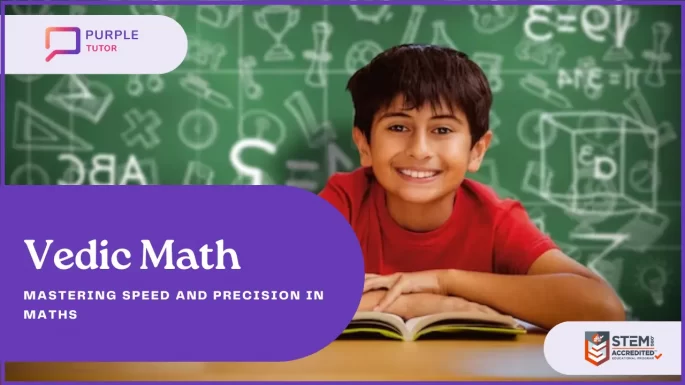

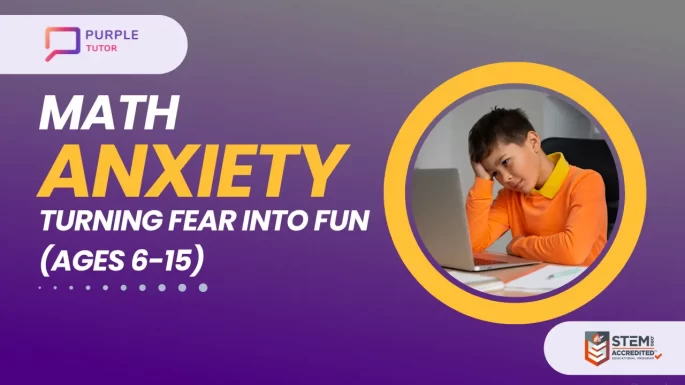
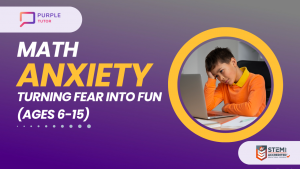 Math anxiety, often known as the fear of math or mathematics anxiety, is a common challenge faced by young learners aged 6-15. In this article, we will delve into the world of math anxiety, its symptoms, and most importantly, how to transform this fear into an enjoyable learning experience. Parents and children alike will discover valuable insights on overcoming math anxiety, ensuring that mathematics becomes a source of fun and confidence.
Math anxiety, often known as the fear of math or mathematics anxiety, is a common challenge faced by young learners aged 6-15. In this article, we will delve into the world of math anxiety, its symptoms, and most importantly, how to transform this fear into an enjoyable learning experience. Parents and children alike will discover valuable insights on overcoming math anxiety, ensuring that mathematics becomes a source of fun and confidence.